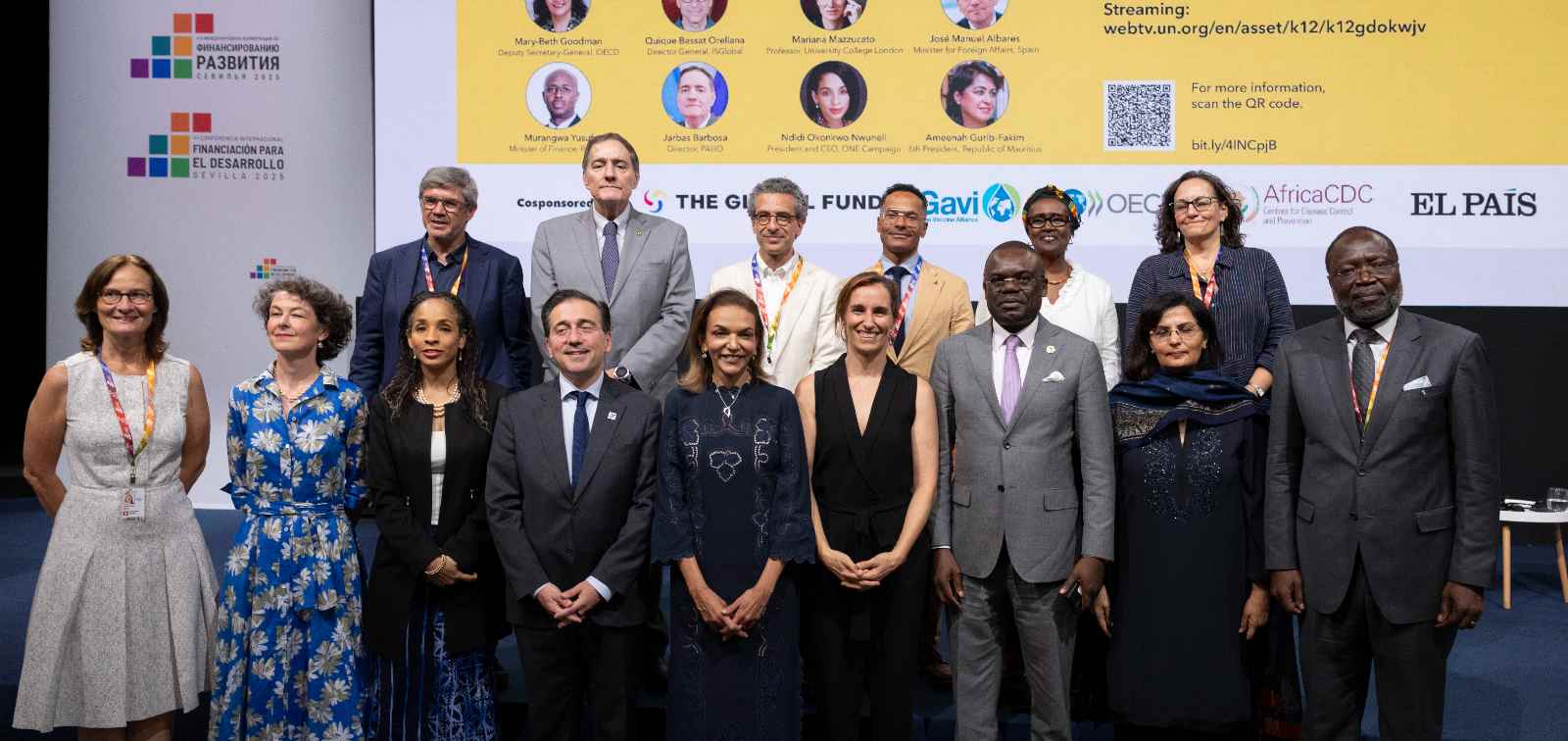La salud no puede depender de la ayuda: Sevilla acoge un debate clave impulsado por ISGlobal
Líderes globales abordan los desafíos urgentes en financiación de la salud global en un acto especial celebrado en el marco de la IV Conferencia de Financiación para el Desarrollo de la ONU
07.07.2025
En el marco de la IV Conferencia de Financiación para el Desarrollo de la ONU que tuvo lugar la semana pasada en Sevilla, ISGlobal coorganizó junto a UNAIDS, la Organización Mundial de la Salud (OMS) y el Gobierno de España el evento especial “Financiación sanitaria para una economía segura y sostenible: hacia una agenda de acción de Sevilla en financiación de la salud”, con la colaboración de instituciones clave como GAVI, el Fondo Global, la OCDE y el Africa CDC.
Durante más de dos horas, líderes políticos, responsables de organismos multilaterales, académicos y representantes de la sociedad civil debatieron cómo hacer frente al déficit estructural en la financiación de la salud global, agravado por la pandemia, la creciente deuda en los países del sur global y el retroceso en la cooperación internacional.
Llamamiento a la transformación del sistema financiero global
“La salud es un derecho, pero también un motor económico”, afirmó la ministra española de Sanidad, Mónica García, en la apertura del acto. García pidió reforzar el multilateralismo, aumentar los recursos para la salud global y articular una respuesta colectiva para que la OMS ejerza plenamente su rol normativo en coordinación con instituciones regionales.
El director general de la OMS, Tedros Adhanom Ghebreyesus, fue contundente al reclamar una transformación profunda del sistema actual, basado en la dependencia de la ayuda. “Los países deben ser dueños de sus propios sistemas sanitarios”, defendió, proponiendo medidas como gravámenes sobre productos nocivos para generar recursos internos sostenibles.
Desde una perspectiva económica, el premio Nobel Joseph Stiglitz denunció los “fallos sistémicos” del sistema financiero internacional que impiden destinar los recursos necesarios a salud y educación. Por su parte, Mariana Mazzucato insistió en que el foco debe ponerse en el fortalecimiento del sector público y en una visión centrada en las personas.
Por su parte, la presidenta del Banco Europeo de Inversiones, Nadia Calviño, destacó que los países del sur global deben ser protagonistas de su propio desarrollo y que las alianzas deben orientarse a dotarlos de capacidades estratégicas, como la producción de vacunas.
Soluciones innovadoras y liderazgo desde el sur global
Durante los paneles, se abordaron estrategias innovadoras como el refuerzo de la producción local de medicamentos en África, el papel de los bancos de desarrollo, la financiación mixta, y la necesidad de modelos que prioricen a las comunidades más vulnerables. “La falta de fondos en la lucha contra el VIH es mortal”, alertó Winnie Byanyima, directora de ONUSIDA, al advertir sobre los efectos de la retirada de financiación por parte de donantes tradicionales.
Desde GAVI, su directora ejecutiva Sania Nishtar subrayó que “el objetivo no es solo conseguir más recursos, sino diseñar instrumentos innovadores y asociaciones eficaces que mejoren la vida de las personas”. En su intervención, defendió modelos de financiación sostenible para inmunización que combinen inversión pública, alianzas privadas y compromiso comunitario.
Peter Sands, director del Fondo Global, recalcó que lograr la autosuficiencia sanitaria es un proceso largo y que, mientras tanto, la ayuda internacional debe ser empleada con eficacia y foco en quienes más lo necesitan. Por su parte, la OCDE alertó de un descenso alarmante en los niveles de financiación para salud, especialmente en África.
Uno de los paneles fue moderado por Quique Bassat, director general de ISGlobal, quien guió el debate sobre marcos de financiación diversificados y el papel fundamental que juegan la ciencia y la investigación en los sistemas de salud del futuro.
El acto concluyó con una intervención del ministro español de Asuntos Exteriores, José Manuel Albares, quien presentó el compromiso financiero del Gobierno con la salud global y reafirmó la necesidad de avanzar hacia un nuevo marco multilateral de financiación. “Invertir en salud no es solo justo, sino también inteligente”, afirmó.



